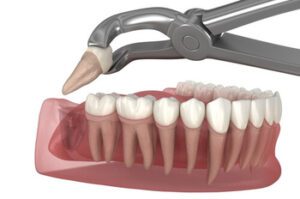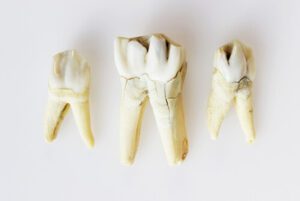Wisdom teeth removal is a common procedure that helps prevent future oral health problems. Understanding the recovery process can make it more manageable and ensure a smooth healing journey. This guide will explore every aspect of wisdom teeth removal recovery, from what to expect after surgery to tips for faster healing.
Why Do Wisdom Teeth Need To Be Removed?
Wisdom teeth, or third molars, are the last teeth to grow in the back of your mouth. These teeth usually emerge during the late teens or early twenties.
For some people, wisdom teeth come in without causing any issues and fit with the rest of their teeth.
Yet, this isn’t always the case. Many people face problems when their wisdom teeth grow.
Sometimes, there isn’t enough room in the jaw for these teeth to come through properly. This can cause them to become affected.

Wisdom teeth may also cause overcrowding, pushing other teeth out of alignment. This can affect your bite and make it harder to clean your teeth, increasing the risk of decay or gum disease.
Taking out harmful wisdom teeth can help prevent future issues such as infections, damage to nearby teeth, or severe pain.
Regular dental check-ups can help determine if this is your best choice.
What To Expect After Wisdom Teeth Removal
Knowing what happens after wisdom teeth removal can help you feel more prepared and relaxed about the process.
Recovery is different for everyone, but here are the key things you can typically expect.
Initial Recovery Period
The first 24 hours after your wisdom teeth removal are crucial for proper healing. During this time, your body protects the surgery site and starts the recovery process.
- Forming A Blood Clot: A blood clot will form in the extraction site. This clot is essential because it covers the area where the tooth was removed, protecting the bone and nerves underneath.
- Protecting The Clot: Avoid actions that could dislodge the clot, such as spitting forcefully or smoking.
Pain And Swelling
Pain and swelling are very common after wisdom teeth surgery, but they are usually manageable.
- What To Expect: You may feel mild to moderate pain around the extraction site and notice swelling in your cheeks or jaw. The swelling might feel more noticeable in the first two or three days.
- How To Manage It: Use an ice pack on your cheeks for short periods during the first 24 hours to reduce swelling. Your dentist may also recommend or prescribe medication to help manage the pain.
- When It Gets Better: You should find that swelling and discomfort start to improve after the first few days.
Bleeding Control
Some bleeding is normal after wisdom tooth extraction, especially in the first few hours.
- How It’s Managed: Your dentist will provide gauze to place over the extraction site. Bite down gently but firmly on the gauze to help the blood clot form.
- What To Do If Bleeding Continues: If you notice bleeding later in the day, replacing the gauze and applying pressure can usually stop it. Keep your head elevated, and avoid strenuous activities.
Other Common Experiences

- Bruising: Mild bruising on your cheeks or jawline may appear a day or two after surgery. This will fade as your body heals.
- Jaw Stiffness: It’s normal to feel some stiffness when opening your mouth. Gently exercising your jaw as directed by your dentist can help.
Understanding what to expect can help you better prepare for the recovery process and take steps to encourage healing.
Always follow your dentist’s advice and ask questions if you’re unsure about anything during your recovery.
Recovery Timeline: How Long Does It Take?
Every person heals differently, but here’s a general timeline for wisdom teeth removal recovery:
- Day 1–2: Immediate Aftercare:
- Focus on resting and controlling swelling with an ice pack.
- Stick to a soft food diet.
- Day 3–5: Managing Pain And Swelling:
- Swelling begins to decrease.
- Continue to avoid spicy foods, hot drinks, and anything that might irritate the surgery site.
- Week 1: Gently Begin Normal Activities:
- Start gently rinsing your mouth with warm salt water to maintain oral hygiene.
- Avoid drinking alcohol and soft drinks.
- Weeks 2–4: Healing Gums And Gradual Recovery:
- Pain relief improves as healing progresses.
- Gradually reintroduce other soft foods into your diet.
Post-Operative Care Tips For A Smooth Recovery
Taking care of yourself after having your wisdom teeth extracted is very important. Following a few simple tips can help you heal faster and feel more comfortable during recovery.
Maintain Oral Hygiene
Keeping your mouth clean is essential after surgery. This helps prevent infection and keeps the healing process on track.
- Gently Rinse: After meals, rinse your mouth gently with warm water. Add a little salt to the water for extra cleanliness.
- Be Careful When Brushing: Avoid brushing the extraction site for the first week. Instead, brush your other teeth gently.
Follow Your Dentist’s Instructions
Your dentist will give you advice specific to your recovery. Following these instructions will help ensure the best outcome.
- Take Your Medication: If your dentist prescribes pain relief or antibiotics, take them to prevent infection.
- Attend Follow-Up Appointments: These check-ups help your dentist ensure everything is healing properly.
Stick To A Soft Food Diet
Eating the right foods can greatly improve recovery. Soft foods are easy to chew and will not irritate the extraction site.
- What To Eat: Mashed potatoes, apple sauce, scrambled eggs, and yoghurt are excellent choices.
- What To Avoid: Avoid hard, crunchy, or spicy foods until your dentist approves them.
Avoid Dry Socket
A dry socket can be painful and slow down healing, so it’s important to protect the blood clot that forms in the tooth socket.
- Skip The Straw: Drinking through a straw can dislodge the clot, so avoid using one until fully healed.
- Avoid Smoking: Smoking can also disturb the clot and increase the risk of infection.
Following these tips can make your recovery smoother and more comfortable. Always contact your dentist if you have concerns or notice anything unusual, such as severe pain or excessive bleeding.
Common Concerns During Recovery
Recovering from wisdom teeth removal can feel overwhelming, especially if it’s your first time having oral surgery. It’s natural to have questions about what to expect.
Here are some common concerns and how to handle them:
Pain And Swelling
Mild discomfort, swelling, and bruising are common after wisdom teeth removal. These symptoms usually peak within the first two to three days and then gradually improve.
- What To Expect: You might feel throbbing pain around the surgery site or notice swelling on your cheeks. This is part of the normal healing process.
- How to Manage It: To reduce swelling, apply an ice pack to your cheeks in 15-minute intervals during the first 24 hours. Over-the-counter or prescribed pain relief medication can also help you stay comfortable.
- When To Call Your Dentist: If the pain becomes severe or doesn’t improve after a few days, call your dentist. This could be a sign of another issue.
Bleeding
Some bleeding is normal in the first 24 hours after surgery, especially when the blood clot forms in the tooth socket.
- How To Handle It: Place a piece of clean gauze over the surgery site and bite down gently for 20–30 minutes. This should help control bleeding.
- When To Be Concerned: If the bleeding is excessive or doesn’t stop after replacing the gauze, contact your dental clinic for advice.
Warning Signs

- What To Watch For: Symptoms such as a fever, increasing pain, worsening swelling, or a bad taste or odour in your mouth may indicate an infection.
- Take Action Quickly: If you notice any of these signs, visit your dentist immediately. Early treatment can prevent complications.
Remember, your dentist is there to help if you have any concerns during your recovery.
Frequently Asked Questions
How many wisdom teeth can be removed at once?
You can remove your lower and upper wisdom teeth in one visit, making recovery easier. Your dentist will determine if this is your best choice based on how your wisdom teeth grow and their condition.
Is it safe to exercise during recovery?
It’s best to avoid hard exercise for at least the first week after surgery. Exercise can increase blood flow, which might cause bleeding. Light activities, like walking, are okay after a few days, depending on how you feel.
Can I brush my teeth after surgery?
Yes, but avoid brushing the extraction site directly during the first few days. Instead, gently rinse with warm salt water.
What are the signs of a dry socket?
Symptoms include severe pain, bad breath, and an empty-looking tooth socket. If you suspect a dry socket, contact your dentist immediately.
When can I return to normal activities?
You can usually resume daily activities within 2–3 days but avoid strenuous exercise for at least a week.
What happens if I don’t remove my wisdom teeth?
If your wisdom teeth cause pain, overcrowding, or other problems, not removing them can lead to infection or damage to your other teeth. Your dentist can help you decide if it’s time to remove them.
Conclusion
Recovering from wisdom teeth removal is essential in maintaining long-term oral health.
Following your dentist’s advice and taking care of yourself can ensure a smooth and successful healing process. If you have concerns or experience unusual symptoms, a dental clinic can provide guidance so you can keep your teeth healthy.
If your wisdom teeth are hurting or causing problems, we’re here for you! Our Bulimba-based team will ensure you feel comfortable and take great care of you.
Call Balmoral Dental Centre at (07) 3113 9789 to schedule your visit. We look forward to helping you feel better soon!
Note: Any surgical or invasive procedure carries risks. Before proceeding, you should seek a second opinion from an appropriately qualified health practitioner.
Sources
Sample J. Wisdom Teeth Removal Recovery: A Complete Guide [Internet]. GoodRx. 2022 [cited 2025 Jan 6]. Available from: https://www.goodrx.com/conditions/dental-care/wisdom-teeth-removal-recovery
McPhillips A. Wisdom Teeth Removal: What Adults Should Expect [Internet]. WebMD. 2024 [cited 2025 Jan 6]. Available from: https://www.webmd.com/oral-health/wisdom-teeth-adult
Smith Y. Tooth Extraction Risks [Internet]. News-Medical. 2021 [cited 2025 Jan 6]. Available from: https://www.news-medical.net/health/Tooth-Extraction-Risks.aspx
Burch K. How To Know If You Need Your Wisdom Teeth Removed [Internet]. Business Insider. 2021 [cited 2025 Jan 6]. Available from: https://www.businessinsider.com/guides/health/dental/wisdom-teeth-removal
Colgate. Recovery After Wisdom Teeth Removal [Internet]. Colgate®. 2023 [cited 2025 Jan 6]. Available from: https://www.colgate.com/en-us/oral-health/wisdom-teeth/what-is-the-recovery-time-after-wisdom-teeth-removal

